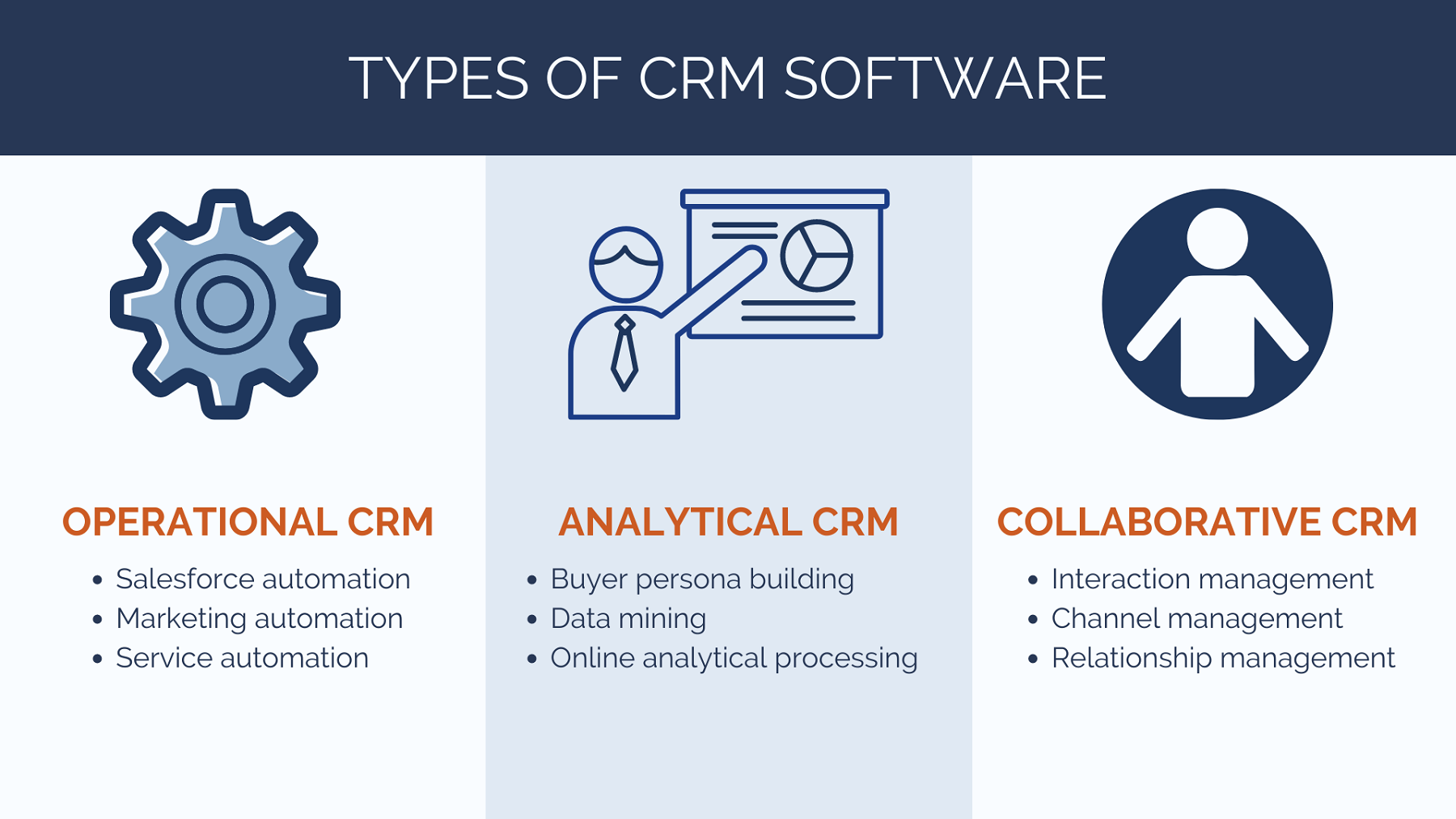TYPES OF CRM SOLUTIONS?

Customer relationship management (CRM) is a kind of business software that enables a business automate repetitive processes for the sake of efficiency and increased customer satisfaction. These have been very effective tools in enabling businesses to manage interactions with customers and organize their prospects in relation. It is in the best interest of any business to understand and know the audience top to bottom, inside and out A CRM software suite can advance the business’ knowledge of the audience through the examination of past purchasing patterns and proper knowledge of individual and demographic-based purchase figures.
Traditionally, CRM software suites have largely been only used by large business owners but studies have shown that more and more small business owners are making use of CRM to target their customers better to gain new customers and retain their existing customer base. All combined, the 2016 saw the CRM market being valued at $36 billion. Most companies that were able to successfully implement a CRM solution experienced a significant improvement in efficiency, customer engagement, sales, and eventually revenue. If you are reading this article, that you have definitely come to the right place to receive a go-to guide on CRM solutions.
WHAT ARE THE TYPES OF CRM SOLUTIONS SOUGHT BY MOST BUSINESSES NOWADAYS?

By design, CRM software suites are divided into three distinct types. Design dictates specific function; some types are better for certain activities compared to others. These are:
- Operational CRMs: As the name implies, the design of these CRM software suites gear them towards operational details more, namely sales-oriented operations. The defining feature of operational CRMs is that they collect and place all data into a single database. This allows many mundane and routine tasks to be run quicker and more efficiently, leaving much room for automation of certain processes. It can also be said that operational CRMs are designed with the primary goal of maintaining good links between the organization and customer, keeping the customers satisfied and happy, helping the company grow.
The other primary benefits include the ability to see which of your potential clients are more likely buy your products or use services. Such prioritization goes a long way in helping you focus your attention and attempt different approaches to the process. Task delegation to the sales team also becomes a greatly streamlined affair as they can be assigned automatically. A great degree of marketing automation is also possible through the integration of email automation systems.
- Analytical CRMs: Again, the name is quite self-explanatory. These CRM software suites are specifically designed to provide you with in-depth assistance in the analysis of customer data gathering information from different sources and providing you with an assessment according to the specific parameters dictated. Your workflow is structured and adjusted in order to better suit the needs of your customers.
More expressly, the advantage of analytical CRMs is best pronounced in data mining operations; the collection of all client information into a central database allows you to easily analyze it as all the calculations are made by the system and the relevant statistics are generated with a few clicks. Insightful when attempting different approaches to different clients. The system also collects detailed history of purchases and product usage, information that makes it easy to see what buying patterns your customers follow. Such information enables you to offer the right products and services at the absolute right time to maximize sales.
- Collaborative CRMs: These CRM software suites specialize in focusing on improving communication and workflow between organization departments in order to improve the overall customer experience, being a different approach altogether in that regard. With features such as advanced interaction and channel management, collaborative CRMs are the best for organizations with business strategies that are especially dependent on its employees working together being in separate teams.
All client interactions from sales to emails and conversations are automatically logged to be accessed at a later data, making it useful for feedback review and in-depth analysis. These CRMs also greatly impact document management by design by managing the documents across all departments and making sure they are always consistent, organized, and up-to-date.
WHAT ARE SOME OF THE EXAMPLES OF CRM SOFTWARE SUITES THAT ARE AVAILABLE IN THE MARKET AND WHAT ARE THE FEATURES THEY OFFER?
There are a lot of players in the CRM market, so many that business owners are often spoilt for choice. Given below are twelve of the most used and most prominent CRM software suites:
- Zoho CRM: Zoho CRM is a sound choice for small businesses looking for a relatively inexpensive and easy to maintain CRM software suite. Integration of all the relevant specific business processes together into one coherent system allows you to reap the benefits of a clearer picture of your business operations and projections.
Zoho CRM also comes with dynamic reporting tools that allow you to create or export data. You also have the ability to link this CRM system with your social media contacts found on Twitter, Facebook, and LinkedIn, greatly expanding the potential for customer reach. By extension, Zoho CRM also integrates with your Apple and Android devices.
- Sugar CRM: Sugar CRM is a good fit for both small and medium-sized businesses, coming with a comprehensive set of tools that help you greatly in strategization and reporting processes, combining them with a drag-and-drop functionality. Sugar CRM also makes use of cloud services, which means you can net those services as well.
Sugar CRM is exceptional among others owing to its capability to be integrated with data storage clients such as Google Docs, office applications such as Microsoft Word and Microsoft Excel, and e-mail clients such as G-mail, Microsoft Outlook, Yahoo Mail, AOL, and more. The wealth of functionality offered by Sugar CRM however, also means that it is one of the more expensive CRM options, possibly making it unfeasible for startups.
- Nimble: Nimble is a low-cost well-suited even for startups. It also offers progressive pricing tiers allowing you to slowly expand functionality in line with the growth of your businesses, also expanding the number of contacts, storage, and features that you can access. As you add information to your account and dashboard, all the helpful data and direction hinting at the possible courses of action with the growing information are made visible. The social media integration is also very strong, keeping the system updated and notified constantly of new developments.
Nimble also includes a marketplace for modules for you to purchase or trial so that you can experiment with different system designs for maximum efficiency in the synergy between marketing, sales, customer services, social media, and accounting. With the right combinations, you can turn Nimble into an extensively comprehensive CRM solution that is also very cost-effective.
- Insightly: This is a simple and easy-to-use CRM software suite with extra benefits in the management of the organization of client interactions and tracking the state of your business targets. Insightly’s user interface is laid out like a social media page which provides a considerable degree of familiarity for any user. It’s also usable on mobile platforms such as iOS and Android, increasing the control in your hands even further.
It can also be integrated with other applications such as Google Apps, Dropbox, Google Drive, and more. Insightly comes in five pricing levels which means that a growing company with growing business requirements can continue to use Insightly.
- ProsperWorks: ProsperWorks is a CRM software suite that works within your G-mail account. Right off the bat, you know that this is one of the low cost solutions among the ones present here. Consequently, the results are a quick setup, minimal training, and features that automate time-intensive customer service and sales work. Since it is operated out of your G-mail account, iOS and Android support is also present which offers you to track all progress in real-time. The G-mail account integration also means that the sales team requires a greatly decreased amount of time to register data within the system if all your information is already present.
The low cost of ProsperWorks makes it very appealing to small businesses and freelancers.
- Capsule CRM: Also focusing on small businesses with limited budgets, Capsule CRM is a newcomer to the market. An easy-to-read interface is accompanied by options for setting reminders, and tracking social media feeds. The API-focused architecture is similar to that of Nimble and Odoo, which means third parties can create programs that can integrate with Capsule, offering you even more functionality. This CRM is unique in how a free plan is offered which consists of two users and 250 contacts.
- Salesforce: Salesforce is among the most widely used CRM software suites in the industry and it has the reputation to match it. The scalability offered by Salesforce is admirable, being suited for small freelancers and small businesses all the way up to large corporations. The user interface is quite user-friendly and intuitive and it also includes a customizable dashboard, tasks, calendar, and activity feeds. Your organization’s IT team would not have to make use of programming knowledge to fully customize Salesforce to your liking.
Integration is also greatly emphasized upon through integrated social CRM functionality with Facebook, LinkedIn, and Twitter and real-time data access to Android, Windows Phone, and iOS.
- Contactually: One of the CRM software suites on this list with a specific focus towards cost-effectiveness. This attempts to bring expensive CRM functionality within an affordable package to small businesses. Contactually offers a key feature in one-on-one communication with customers and prospects, leading to new avenues in followups.
Closing the connection gap with your contacts and customers across social media platforms is thus Contactually’s main design goals, tying in well with the benefits of real-time data management.
- Campaigner CRM: This is another low-cost CRM with a powerful drag and drop functionality which works in creating an user-friendly environment for you. Similar to many other CRM software suites of its type, the time associated with learning how it works is greatly reduced. It also comes with a free plan, progressing onwards to increasing scalability.
- Odoo: Odoo has come to stand as one of the market leaders in CRM. Unparalleled scalability and a robust modular design both stand as two of the strongest features affecting other metrics which contribute to it becoming a true titan in the CRM market. Odoo has found use with all types of businesses from small businesses and freelancers to large corporations.
- ContactMe: This CRM software suite is the most lowest-cost, basic software suite among the rest. Being absolutely suitable for freelancers and small businesses. Improved contact organization is its particular area of excellence and it is offered in tiered business plans.
- Freshsales: A very user-friendly interface makes Freshsales an attractive option for many users across the entire spectrum. The automation options for tasks, leads, deals, and appointments are foolproof and easy to navigate through. It also shines in its careful placement of assistance tools to get you through any rough patches regarding the various functions of the software.
WHAT ARE THE EXAMPLES TO HELP YOUR DECISION?

The best examples come from big companies, and it is from big companies that small companies learn. British Airways had managed to save themselves from bankruptcy by conducting a planned CRM implementation project that saw them automate marketing campaigns and customer communications. Being in one of the most customer-oriented businesses was the push that brought British Airways to profit from a CRM software suite.
BMW has leveraged the power of the internet and has actively promoted customer care projects aiming to bringing BMW car owners closer to the company in a program called Owner’s Circle. This has invigorated the company’s customer loyalty and retention rates to great extents. Nokia has also used Salesforce to help them bring together workable plans to introduce standardization of data collection and organization. They have also benefited by being able to manage different campaigns and tactics catering to a very diverse customer base. Small businesses definitely can and should benefit from a CRM system that has been implemented successfully, compare and chose your CRM software suite and look for the right cost-benefit spot.
Syncoria is a digital transformation firm based in Canada and an official Odoo Ready partner.